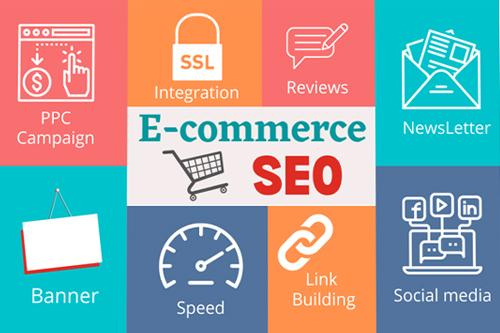In the fast-paced world of eCommerce, having a visually appealing website is just the beginning. To truly succeed, your online store needs to be visible to potential customers. This is where Search Engine Optimization (SEO) comes in. By implementing effective SEO strategies, you can drive organic traffic, boost sales, and ensure long-term growth for your eCommerce business. In this blog, we will explore ten must-have SEO services for eCommerce growth.
1. Keyword Research
Finding the Right Words to Attract Customers
Keyword research is the cornerstone of any successful SEO strategy. It involves identifying the terms and phrases that potential customers use when searching for products similar to yours.
Why It Matters:
- Targeted Traffic: By using the right keywords, you attract visitors genuinely interested in your offerings.
- Competitive Advantage: Knowing the right keywords helps you stay ahead of competitors.
How to Do It:
- Use tools like Google Keyword Planner, SEMrush, or Ahrefs to find relevant keywords with high search volume and low competition.
- Focus on long-tail keywords (phrases with three or more words) that better match user intent.
2. On-Page SEO
Optimizing Your Website’s Content and Structure
On-page SEO refers to optimizing the content and HTML source code of your website pages. This includes titles, meta descriptions, headings, and image alt texts.
Why It Matters:
- User Experience: A well-structured website keeps visitors engaged and encourages them to explore further.
- Search Engine Ranking: Proper optimization signals to search engines what your content is about.
How to Do It:
- Include target keywords naturally in your titles and headings.
- Write unique and compelling meta descriptions to encourage clicks from search results.
- Optimize images by using descriptive file names and alt tags.
3. Technical SEO
Ensuring Your Site Works Smoothly
Technical SEO involves optimizing the backend of your website to improve its performance and accessibility. This includes site speed, mobile-friendliness, and secure connections (HTTPS).
Why It Matters:
- Improved Performance: Fast-loading sites provide a better user experience and keep visitors on your site longer.
- Crawling and Indexing: A technically sound site makes it easier for search engines to crawl and index your pages.
How to Do It:
- Use tools like Google PageSpeed Insights to analyze site speed and make necessary improvements.
- Ensure your website is mobile-responsive to provide a seamless experience on all devices.
- Implement an SSL certificate for secure browsing.
4. Content Marketing
Creating Valuable and Relevant Content
Content marketing is about producing high-quality, valuable content that resonates with your audience. This can include blog posts, product descriptions, videos, and guides.
Why It Matters:
- Building Trust: Quality content positions your brand as an authority in your niche.
- Increasing Organic Traffic: Engaging content attracts backlinks and boosts your SEO efforts.
How to Do It:
- Create blog posts that address common questions or concerns of your target audience.
- Use visuals, infographics, and videos to enhance your content and keep visitors engaged.
- Promote your content on social media and through email marketing to expand your reach.
5. Link Building
Establishing Authority Through Backlinks
Link building is the process of acquiring backlinks from other reputable websites. These links act as endorsements and can significantly boost your search engine rankings.
Why It Matters:
- Higher Rankings: Quality backlinks improve your site’s credibility and ranking potential.
- Referral Traffic: Links from popular sites can drive targeted traffic to your store.
How to Do It:
- Reach out to bloggers and influencers for collaborations or guest blogging opportunities.
- Create shareable content that naturally attracts backlinks.
- Participate in online communities relevant to your niche to establish relationships.
6. Local SEO
Reaching Customers in Your Area
If your eCommerce business has a physical location or serves specific areas, local SEO is crucial. This helps your business appear in local search results, making it easier for nearby customers to find you.
Why It Matters:
- Increased Visibility: Local SEO boosts your chances of appearing in “near me” searches.
- Drive Foot Traffic: Optimizing for local searches helps bring customers to your physical store, if applicable.
How to Do It:
- Optimize your Google My Business listing with accurate business information.
- Encourage customers to leave reviews to improve your local ranking.
- Use local keywords in your website content to attract nearby customers.
7. User Experience (UX) Optimization
Enhancing the Customer Journey
User experience (UX) optimization focuses on improving how visitors interact with your website. A positive UX can lead to higher conversion rates.
Why It Matters:
- Increased Engagement: A well-designed site keeps visitors on your page longer.
- Higher Conversions: Satisfied users are more likely to make a purchase.
How to Do It:
- Simplify your site’s navigation to make it easy for users to find products.
- Ensure fast loading times and mobile responsiveness.
- Use clear calls-to-action (CTAs) to guide visitors through the buying process.
8. Social Media Integration
Leveraging Social Platforms for Visibility
Social media is a powerful tool for driving traffic to your eCommerce site. Integrating social media with your SEO strategy can enhance visibility and engagement.
Why It Matters:
- Broader Reach: Social media helps you reach a larger audience and drive traffic to your site.
- Enhanced Brand Awareness: Active social media presence builds brand recognition and trust.
How to Do It:
- Share your content on various social media platforms to engage with your audience.
- Use social sharing buttons on your product pages to encourage visitors to share your content.
- Engage with your audience through comments, messages, and posts to build relationships.
9. Analytics and Reporting
Measuring the Success of Your SEO Efforts
Analytics and reporting are essential for tracking the effectiveness of your SEO strategies. This includes monitoring traffic, conversion rates, and user behavior on your site.
Why It Matters:
- Data-Driven Decisions: Analyzing data helps refine your strategies for better results.
- Identifying Trends: Understanding user behavior informs your marketing efforts and product offerings.
How to Do It:
- Use Google Analytics to monitor key metrics such as traffic sources and user behavior.
- Set up goals to track specific actions like purchases or newsletter sign-ups.
- Regularly review your SEO performance and adjust your strategies based on analytics insights.
10. Continuous SEO Maintenance
Keeping Up with Changes and Trends
SEO is not a one-time effort; it requires continuous maintenance to stay relevant. Regularly updating your strategies based on trends and algorithm changes is essential for long-term success.
Why It Matters:
- Adaptation to Changes: Search engine algorithms frequently change, and staying updated ensures your site remains compliant.
- Ongoing Improvements: Regularly updating content and SEO strategies keeps your website fresh and engaging.
How to Do It:
- Regularly audit your website to identify areas for improvement.
- Update old blog posts with new information and keywords.
- Stay informed about SEO trends and algorithm updates through industry blogs and forums.
Conclusion
Investing in these ten must-have SEO services can significantly impact your eCommerce growth. From keyword research to continuous maintenance, each component plays a vital role in improving your online visibility and driving traffic. By prioritizing SEO, you not only enhance your search engine rankings but also build a strong foundation for sustainable growth in a competitive market.







More Stories
Hellstar Hoodie has become an iconic piece in
Why Should Consider Buying Dog Supplements
Importance of Compliance in Training Programs